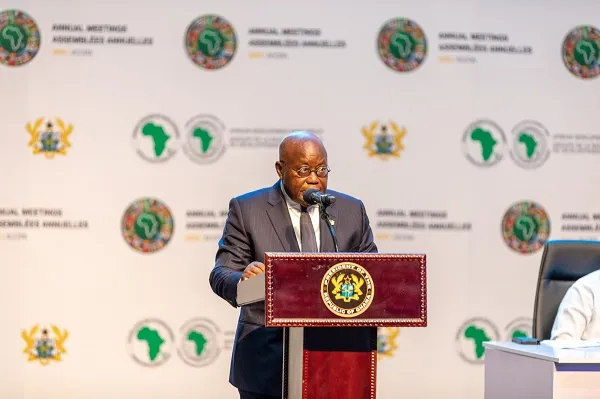President Nana Addo Dankwa Akufo-Addo has told the African Development Bank (AfDB) that the consequences of the Russian invasion of Ukraine, are compounding the emerging socio-economic vulnerabilities, which have been heightened by COVID-19.
Speaking during the Annual General Meeting (AGM) of the AfDB in Accra, Mr Akufo-Addo said Africa is now confronted with the consequences of the Russian invasion of Ukraine, which are compounding the emerging socio-economic vulnerabilities, which have been heightened by COVID-19.
“Since February,” he said, “prices of staple food commodities have surged drastically. Africa faces a fertilizer shortage of some 2 million metric tons this year, estimated at 2 billion dollars, according to the International Fund for Agricultural Development, potentially creating a productivity deficit of twenty to fifty percent (20-50%) in agriculture.”
Rising food prices disproportionately affect African families, as food consumes some forty percent (40%) of household income, compared to less than twenty percent (20%) in advanced economies, Mr Akufo-Addo added.
He further indicated that “Energy markets have been significantly volatile, with dire consequences for households and public finances. According to the IMF, a five dollar ($5) per barrel increase in oil prices reduces global output by around 0.25 percent, but, for non-oil exporting economies in Africa, that figure increases to 0.6 percent.
“As a result, the United Nations Conference on Trade and Development has cut global growth prospects by 1 percent, and the World Economic Outlook (April 2022) predicts global growth will slow from 6.1 percent in 2021 to 3.6 percent in 2022; 0.8 percentage points lower than projected in January 2022. Amidst economic slow-down and the rising cost of fuel and food, the cost of living is increasing.
“The immediate economic consequences – whether in the form of rising inflation, lower growth, increased inequality, and greater financial instability – are likely to permeate deeper, as they coincide with weakened economic positions due to the pandemic and preexisting and now elevated debt challenges.
“The debt challenges are compounding for us in Africa. In pursuit of policy autonomy in the ‘Age of Choice’ for economic transformation, our debt profile has changed markedly. According to UNECA, the debt to GDP ratio rose from 60 percent to an estimated 71.1 percent between 2019 and 2020, largely because of the COVID-19 pandemic.
“Eighteen (18) African economies have faced credit downgrades, even when all economies were suffering fallouts from the pandemic last year. Amidst these challenges, we must be aware of our vulnerability to the monetary policy stance of the US Federal Reserve, and the risk of so-called “taper-tantrums”, as investors may exit our markets further exacerbating the increasing cost of borrowing.”
By Laud Nartey|3news.com|Ghana


